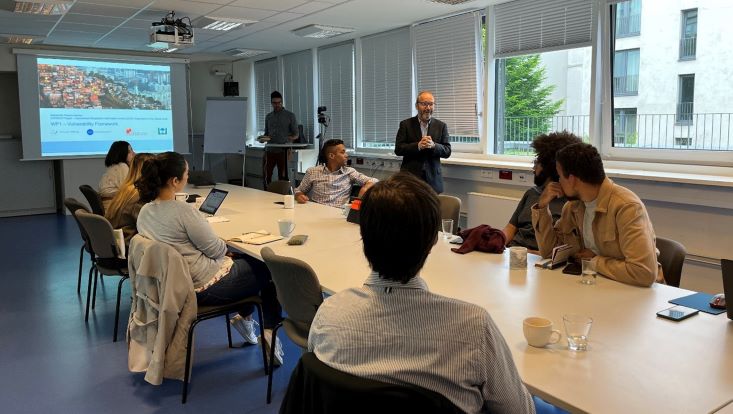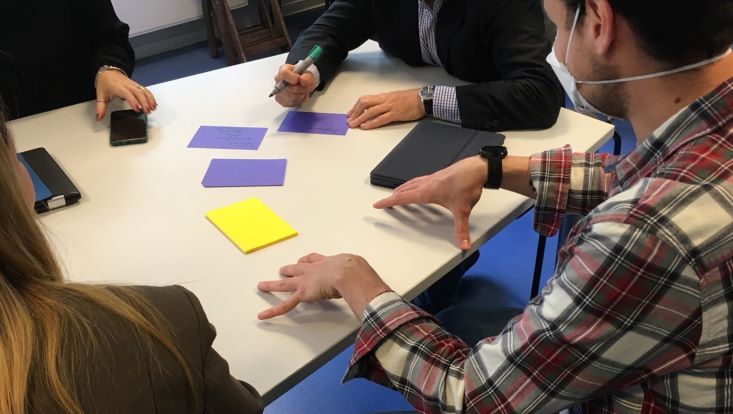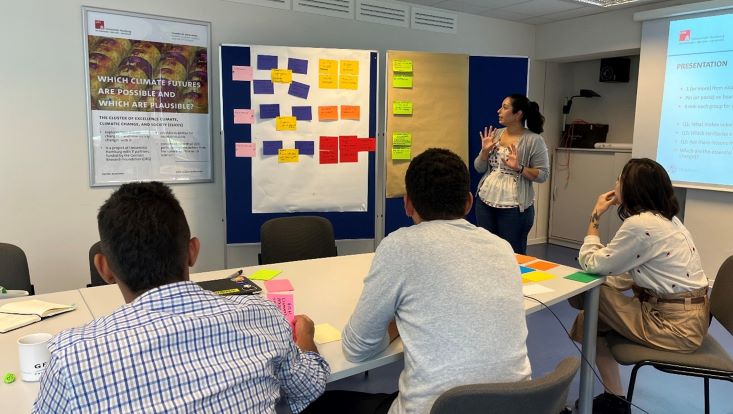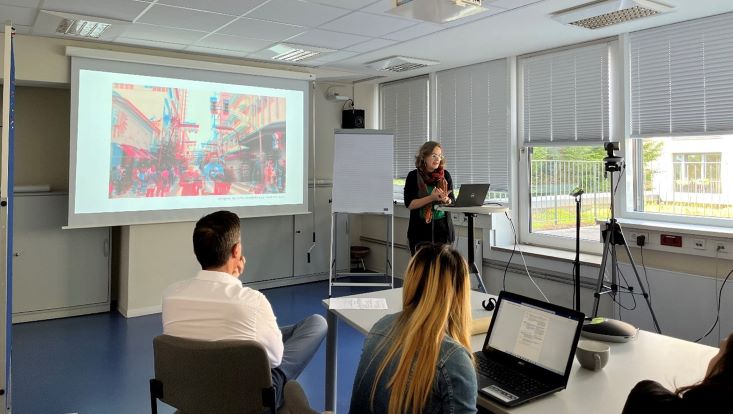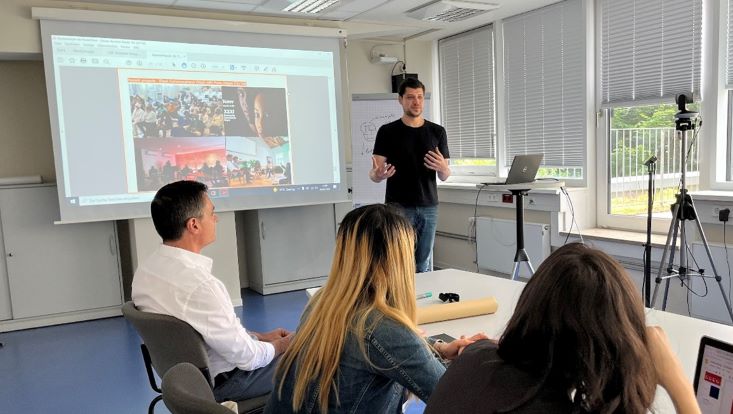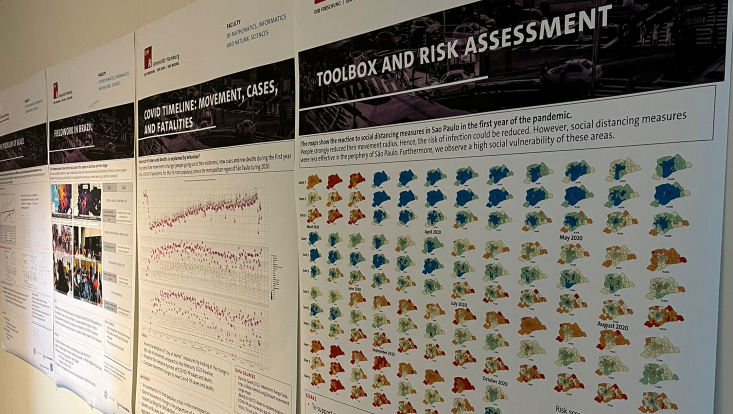Workshop in Hamburg (06.2022)
The COVIDGI Project workshop was all about Intensive exchange formats, exciting participant inputs, and a very productive networking atmosphere. In early June 2022, we brought stakeholders of the project from Brazil, Argentina, Switzerland, among others to spend a week with us in Hamburg. We discussed scientific approaches ranging from the ethnographic to remote sensing, including statistics, indicator systems, and a lot of fieldwork. The group also talked about the challenges of living and researching during the COVID-19 pandemic, such as investigating health, urbanization, mobility, geography, and data science. Getting together was precious after so long in different forms of isolation, and the future collaborations we developed became proof of that. Other outcomes of the workshop are numerous, but below you will find a short wrap-up of each session and some visual impressions of the event.
The workshop started with our work on vulnerability. Alexandre Pereira Santos presented our work, starting from Adger and Pelling’s concepts and moving into the mixed methods we use in COVIDGI. He finished off by getting us working together on the factors and territories of vulnerability in Brazil and the possible responses to the ongoing COVID-19 crisis. You can see more of his work in this recent paper.
Katharina Heider coordinated a gallery poster session about our Toolbox. In the session, we could see, side by side, different aspects of our research that range from Random and Fixed effects statistics to our field work in Brazil, risk scores considering vulnerability, and the effects of social behavior in COVID-19 cases and deaths using volunteer geographic information.
Yechennan Peng and Mobeen Muhammad showed their work on Agent-Based-Models. The cherry on the cake was the group work where we discussed profiles, behavior, and the impacts of mobility choices in exposure to COVID-19. At the end, we ran the model live and discussed some of the results.
The extraordinary participant inputs sessions kicked-off under the auspices of Prof. Julio Vargas. We explored the synergies between our guests:
In the first participant input session, Prof. Roberta Kronka Mülfarth presented her work at the University of São Paulo on active mobility and the urban environment. The contrast of areas full of infrastructure but empty of people showed contradictions in the production of open spaces.
Prof. Ligia Vizeu Barrozo then presented her work on urban space and health at Institute of Advanced Studies at the University of São Paulo. Amazing publications that pinpoint how income is still a great differentiator of the impacts from COVID-19. Other results include the shifting, from low to high vulnerability areas, of COVID cases during the development of the pandemic, the distribution of hospital case-fatality rates, and the development of a socioeconomic index for health and social research, GeoSES.
Cleiton Chiarel provided us with insights into the local community initiatives. His work revolves around creative economy, social innovation, and culture. His presentation showed an urgent need for researchers to connect to these organizations, especially to understand how policy plays out during crises like COVID-19.
Sergio Gresse Jr discussed his initial research efforts in public health at HAW Hamburg. He joined COVIDGI last March as student assistant and sees the permanent changes COVID-19 brought to cities and society. He is especially concerned with the unprecedented impacts in behavior and mental health. He also made a point on the experience he is having when working on urban studies as a healthcare professional during this crisis.
Orla Canavan started us on a canvas to get our users mapped out. It is incredible how much we assume we know and how hard it is to pinpoint the added value and the problems science must face. It was refreshing to see the production of science and policy having clear stakeholders in mind.
Leonardo Veiga, from the Institute for Transportation and Development Policy, presented his work on the Mobilidados platform. We profited from the powerful open data policies regarding transportation. The discussion was lively and pointed at achievements and challenges to impact the intended audience of open data.
Prof. Julio Celso Vargas from the Rio Grande do Sul Federal University presented his research on health and urban environments. His production delves into the social determinants of health and currently explores the role of behavioral choices in conditions such as heart-diseases and diabetes. He also pointed out that with COVID-19, “the communicable diseases strike back”, in ways many supposed were on the past.
Orla Canavan brought her design experience in the International Red Cross 510 initiative with full force. She showed how data needs to be integrated into the narratives of those described by information. 510's work in Malawi is powerful and her mediation worked wonders for our collective effort.
Bibiana Umann discussed her work with two indigenous communities in Porto Alegre. Fighting for rights over their territories and ways of living, these examples show how information must have purpose and ethics. A pungent lesson for science is that “By working by demand, the communities come to us, telling us what they need. We take only small projects to be sure we can deliver them.”
Nahir Cantar from the Consejo Nacional de Investigaciones Científicas y Técnicas in Argentina showed her two minds: the researcher on heritage and the social agent on housing projects. Formidable work on both tracks, bringing qualitative methods of the highest quality.
Ygor Melo, the national social manager of TETO Brazil delivered his powerful message on the tragedy of COVID-19 in the coutry. He experienced from an early age what is to struggle for housing and in Teto he pushes for acquiring, managing, and using information to provide critical support to some of the most vulnerable communities in Brazil.
Vitor Colombo from the EPFL in Switzerland showed potent work on water, sanitation, and hygiene (WASH) in Africa. His research on mapping diseases like diarrhea shows the limits of our knowledge of basic problems. His final question still has us wondering.
At last, the workshop closed with a collective session of planning future cooperation. Orla Canavan (master) struck again with her collaborative methods, and we created some pretty powerful alignments between the participants.
It was a wonderful and productive workshop, and we would like to thank all participants for their exciting inputs and the open exchange!

